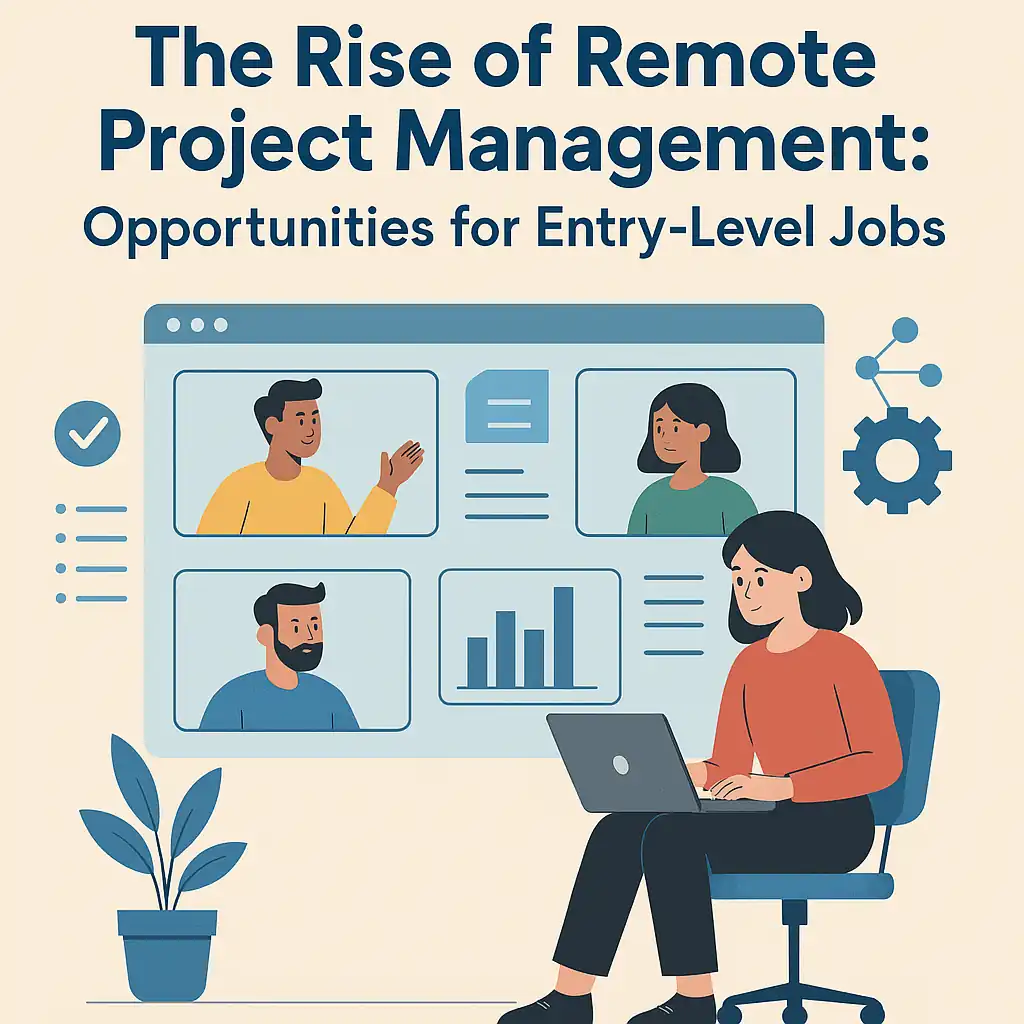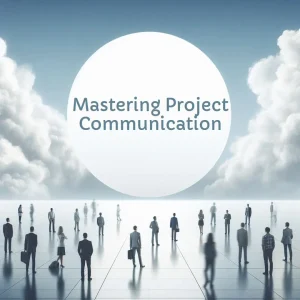Introduction
Project management is a critical discipline that involves planning, executing, and overseeing projects to ensure they are completed on time, within scope, and on budget. It plays a vital role across various industries, including technology, healthcare, construction, and finance, where effective project management can significantly influence an organization’s success. As businesses increasingly rely on structured approaches to manage their projects, the demand for skilled project managers continues to grow, creating a wealth of opportunities for those entering the field.
In recent years, the concept of remote work has gained unprecedented traction, particularly in the wake of the COVID-19 pandemic. Organizations have adapted to new ways of working, leveraging technology to facilitate collaboration and communication among teams dispersed across different locations. This shift has not only transformed traditional work environments but has also expanded the geographical boundaries for job seekers, allowing them to pursue opportunities that were previously limited to specific locations.
This blog aims to explore how the rise of remote work has created new avenues for entry-level positions in project management. As companies embrace flexible work arrangements, they are increasingly open to hiring remote project managers, including those just starting their careers. By examining the intersection of remote work and project management, we will highlight the skills and strategies that aspiring project managers can leverage to secure their first roles in this dynamic field.
The Evolution of Remote Work in Project Management
The landscape of project management has undergone significant transformation, particularly with the rise of remote work. This shift has been largely driven by technological advancements and the global impact of the COVID-19 pandemic, which forced many organizations to adapt to new ways of working. Here are some key points that illustrate this evolution:
- Shift to Remote Work: The COVID-19 pandemic accelerated the adoption of remote work across various industries, including project management. Organizations had to quickly pivot to virtual collaboration tools and platforms to maintain productivity and communication among team members. This transition has fundamentally changed how projects are managed, with a greater emphasis on digital communication and project tracking tools [1].
- Benefits of Remote Work: Remote work offers numerous advantages for project managers and their teams. One of the most significant benefits is flexibility, allowing project managers to create schedules that accommodate different time zones and personal commitments. Additionally, remote work provides access to a global talent pool, enabling organizations to hire skilled professionals from diverse backgrounds, which can enhance creativity and problem-solving within teams [1][2].
- Changing Skills and Tools: As project management has adapted to remote work, the skills and tools required for success have also evolved. Project managers now need to be proficient in various digital tools for project tracking, communication, and collaboration. Skills such as virtual team management, digital communication, and adaptability have become essential. Furthermore, understanding how to foster team cohesion and maintain engagement in a virtual environment is crucial for project success [2][3].
Understanding Entry-Level Project Management Roles
The landscape of project management has evolved significantly, particularly with the rise of remote work. For job seekers interested in entering this field, understanding entry-level project management roles is crucial. These positions not only serve as a gateway to advanced roles but also play a vital role in the overall success of projects within organizations.
Defining Entry-Level Project Management Roles
Entry-level project management roles typically include:
- Project Coordinator: This role involves supporting project managers by organizing project activities, maintaining schedules, and ensuring that project documentation is up to date. Project Coordinators often act as a liaison between team members and stakeholders, facilitating communication and collaboration.
- Assistant Project Manager: An Assistant Project Manager works closely with project managers to help plan, execute, and close projects. They may assist in resource allocation, budget management, and risk assessment, gaining hands-on experience in project management processes.
- Project Analyst: This position focuses on analyzing project data and performance metrics. Project Analysts help in identifying areas for improvement and ensuring that projects align with organizational goals. They often prepare reports and presentations to communicate findings to project stakeholders.
Typical Responsibilities and Expectations
In these entry-level roles, candidates can expect to undertake a variety of responsibilities, including:
- Communication: Effective communication is essential. Entry-level project managers must convey information clearly to team members and stakeholders, ensuring everyone is aligned on project goals and timelines [3].
- Organization: Managing schedules, tracking project progress, and maintaining documentation are key tasks. Strong organizational skills are necessary to keep projects on track and within budget [4].
- Problem-Solving: Entry-level project managers are often tasked with identifying issues and proposing solutions. This requires analytical thinking and the ability to adapt to changing circumstances [5].
- Collaboration: Working as part of a team is fundamental. Entry-level roles require collaboration with various departments and stakeholders, fostering a team-oriented environment [6].
The Value of Gaining Experience in Entry-Level Roles
Starting in an entry-level project management position provides invaluable experience that can significantly enhance career progression. Here are some key benefits:
- Skill Development: These roles allow individuals to develop essential project management skills, such as time management, budgeting, and stakeholder engagement, which are critical for future success [7].
- Networking Opportunities: Entry-level positions often provide opportunities to connect with experienced professionals in the field. Building a network can lead to mentorship and job opportunities down the line [8].
- Career Advancement: Gaining experience in entry-level roles is often a prerequisite for advancing to more senior positions, such as Project Manager or Program Manager. Employers typically look for candidates who have a solid foundation in project management principles and practices [9].
Skills Required for Remote Project Management Jobs
As the landscape of work continues to evolve, remote project management has emerged as a significant opportunity for entry-level job seekers. To thrive in this environment, candidates must develop a diverse skill set that encompasses both technical and soft skills. Here are the essential skills needed for entry-level project management positions in a remote setting:
Key Project Management Skills
- Communication Skills: Effective communication is paramount in remote project management. Project managers must be able to convey information clearly and concisely, whether through emails, video calls, or project updates. Strong written communication skills are particularly important, as much of the interaction occurs in written form [2][7].
- Organization and Time Management: The ability to prioritize tasks and manage time efficiently is crucial. Remote project managers need to create structured routines and prioritize their workload based on urgency and importance. This skill helps in maintaining productivity and meeting deadlines [6][10].
- Adaptability and Flexibility: The remote work environment can be unpredictable, requiring project managers to adapt quickly to changing circumstances. Being flexible in approach and open to new ideas is essential for navigating challenges that may arise during a project [4][14].
Technical Skills
- Proficiency with Project Management Software: Familiarity with project management tools is vital for tracking progress, managing resources, and reporting on project metrics. Entry-level project managers should be adept at using software such as Trello, Asana, or Microsoft Project to facilitate collaboration and streamline workflows [15].
- Collaboration Tools: In a remote setting, project managers must utilize various collaboration tools to ensure team members can communicate effectively. Knowledge of platforms like Slack, Zoom, or Microsoft Teams is essential for maintaining team cohesion and facilitating discussions [8].
Importance of Soft Skills
- Problem-Solving Skills: Remote project managers often face unique challenges that require innovative solutions. The ability to think critically and solve problems efficiently is a valuable asset in ensuring project success [4][10].
- Teamwork: Even in a remote environment, fostering a sense of teamwork is crucial. Project managers must be able to build relationships and encourage collaboration among team members, ensuring that everyone is aligned and working towards common goals [13][14].
Where to Find Remote Entry-Level Project Management Jobs
The shift towards remote work has opened up a plethora of opportunities for entry-level project management positions. For job seekers eager to embark on a project management career, understanding where to look for these roles is crucial. Here are some effective strategies and resources to help you navigate the remote job market.
1. Popular Job Boards and Websites
Several job boards and websites specialize in remote work, making them ideal platforms for finding entry-level project management positions. Consider exploring the following:
- Remote.co: This site focuses exclusively on remote job listings across various industries, including project management. It offers a user-friendly interface to filter jobs by category and experience level.
- We Work Remotely: Known for its extensive listings, this platform connects job seekers with companies that prioritize remote work. It features a dedicated section for project management roles.
- FlexJobs: This subscription-based service curates remote and flexible job opportunities, ensuring that listings are legitimate and high-quality. It’s a great resource for finding entry-level positions in project management.
2. Leveraging Social Media Platforms
Social media can be a powerful tool in your job search. Here’s how to effectively use platforms like LinkedIn and Twitter:
- LinkedIn: Optimize your LinkedIn profile to highlight relevant skills and experiences. Use the platform to connect with professionals in the project management field, join industry-specific groups, and follow companies that interest you. Regularly check the job section for remote opportunities and engage with posts to increase your visibility.
- Twitter: Follow project management hashtags and accounts to stay updated on job openings and industry trends. Engaging with tweets and participating in discussions can help you network with professionals and discover hidden job opportunities.
3. Participation in Online Communities and Forums
Engaging with online communities and forums can significantly enhance your job search. Here are some ways to get involved:
- Join Project Management Forums: Participate in forums such as ProjectManagement.com or Reddit’s r/projectmanagement. These platforms allow you to ask questions, share experiences, and learn from others in the field.
- Attend Webinars and Virtual Events: Many organizations host webinars and virtual networking events focused on project management. These events provide opportunities to connect with industry professionals and learn about job openings.
- Engage in Online Communities: Platforms like Slack and Discord often have channels dedicated to project management. Joining these communities can help you network with peers and gain insights into the job market.
By utilizing these resources and strategies, job seekers can effectively navigate the remote job landscape and uncover entry-level project management opportunities. The rise of remote work has made it easier than ever to start a career in project management, provided you know where to look and how to connect with the right people.
Preparing Your Application: Resume and Cover Letter Tips
As the landscape of project management evolves with the rise of remote work, job seekers must adapt their application materials to stand out in a competitive market. Here are some actionable tips to help you craft a compelling resume and cover letter tailored for entry-level project management roles in a remote setting.
Tailoring Your Resume
- Highlight Relevant Skills: Focus on skills that are particularly valuable in remote project management, such as communication, time management, and proficiency with project management tools (e.g., Trello, Asana, or Microsoft Project). Make sure these skills are prominently featured in your resume to catch the hiring manager’s attention [1].
- Showcase Remote Work Experience: If you have any experience working remotely, whether through internships, volunteer work, or freelance projects, be sure to include it. Even informal experiences can demonstrate your ability to thrive in a remote environment. Detail your responsibilities and achievements in these roles to illustrate your capability [2].
- Use Action-Oriented Language: When describing your experiences, use strong action verbs to convey your contributions effectively. Phrases like “coordinated,” “managed,” and “facilitated” can help emphasize your proactive approach to project management tasks [3].
Writing Your Cover Letter
- Address Remote Work Dynamics: In your cover letter, reflect an understanding of the unique challenges and opportunities that come with remote project management. Discuss how you can effectively communicate and collaborate with team members across different locations, showcasing your adaptability and problem-solving skills [4].
- Connect Your Qualifications to the Role: Clearly articulate why you are a good fit for the position by tying your qualifications to the specific requirements outlined in the job description. This connection will demonstrate your genuine interest in the role and the organization [5].
- Include a Strong Call-to-Action: Conclude your cover letter with a compelling call-to-action, inviting the hiring manager to discuss your application further. This not only shows your enthusiasm for the position but also encourages them to take the next step in the hiring process [6].
By following these tips, you can create a tailored resume and cover letter that effectively highlight your qualifications for entry-level project management roles in a remote work environment. Emphasizing relevant skills, experiences, and an understanding of remote dynamics will significantly enhance your chances of landing an interview.
Interviewing for Remote Project Management Positions
As the landscape of work continues to evolve, remote project management roles are becoming increasingly accessible, especially for entry-level job seekers. This section aims to equip you with the necessary tools to excel in remote interviews for project management positions.
Common Interview Questions and Effective Responses
When preparing for an entry-level project management interview, it’s essential to anticipate the types of questions you may encounter. Here are some common questions along with tips on how to respond effectively:
- Describe a project you managed. What was the goal, team size, and your approach? This question assesses your understanding of project management fundamentals. Be candid and provide specific details about your role, the project’s objectives, and the strategies you employed to achieve success [2].
- How do you prioritize tasks in a project? Highlight your organizational skills and ability to manage time effectively. Discuss methods such as the Eisenhower Matrix or Agile methodologies that you might use to prioritize tasks [4].
- What tools do you use for project management? Familiarity with project management software is crucial. Mention tools like Trello, Asana, or Microsoft Project, and explain how you have used them to enhance project efficiency [3].
Demonstrating Remote Work Skills
In a remote interview, showcasing your remote work skills is vital. Employers are looking for candidates who can thrive in a virtual environment. Here are some key skills to highlight:
- Communication Skills: Emphasize your ability to communicate clearly and effectively, both verbally and in writing. This is crucial for remote collaboration [5].
- Technology Proficiency: Discuss your comfort level with various collaboration tools such as Zoom, Slack, or Microsoft Teams. Being tech-savvy can set you apart from other candidates [9].
- Self-Motivation and Time Management: Share examples of how you manage your time and stay motivated while working remotely. This could include setting personal deadlines or using productivity techniques [5].
Setting Up a Professional Remote Interview Environment
Creating a conducive environment for your remote interview can significantly impact the impression you make. Here are some tips to ensure your setup is professional:
- Choose a Quiet Location: Find a space free from distractions and background noise. This will help you focus and present yourself in the best light [10].
- Check Your Technology: Ensure that your computer, camera, and microphone are functioning properly before the interview. A technical glitch can disrupt the flow of the conversation [9].
- Dress Professionally: Even though the interview is remote, dressing appropriately can convey professionalism and seriousness about the position [10].
By preparing for common interview questions, demonstrating your remote work skills, and setting up a professional environment, you can enhance your chances of landing an entry-level project management position in the growing field of remote work.
Building a Successful Remote Project Management Career
The landscape of project management has evolved significantly with the rise of remote work, creating a wealth of opportunities for entry-level job seekers. As organizations increasingly embrace remote teams, aspiring project managers must adapt to this new environment while focusing on their long-term career growth. Here are some key points to consider:
1. Importance of Continuous Learning and Professional Development
In the fast-paced world of project management, continuous learning is essential. The demand for project managers is on the rise, and staying updated with the latest trends, tools, and methodologies is crucial for success. Here are some strategies to enhance your skills:
- Pursue Certifications: Obtaining relevant certifications can significantly boost your employability. Consider certifications like the Project Management Professional (PMP) or Certified Associate in Project Management (CAPM) to demonstrate your commitment and knowledge in the field [7].
- Engage in Online Courses: Many platforms offer courses specifically tailored to project management skills, including Agile methodologies, risk management, and communication strategies. These courses can help you build a solid foundation and keep your skills sharp [6].
- Stay Informed: Regularly read industry blogs, attend webinars, and participate in workshops to stay abreast of new developments in project management and remote work practices [4].
2. Networking and Mentorship Opportunities
Building a professional network is vital, especially in a remote work environment where face-to-face interactions are limited. Here are some ways to connect with others in the field:
- Join Online Communities: Participate in forums, social media groups, and professional networks dedicated to project management. Engaging with these communities can provide valuable insights and job leads [2].
- Seek Mentorship: Finding a mentor who has experience in remote project management can be incredibly beneficial. A mentor can offer guidance, share their experiences, and help you navigate the challenges of starting your career [8].
- Attend Virtual Events: Many organizations host virtual conferences and networking events. These platforms allow you to meet industry professionals, learn from their experiences, and expand your network [9].
3. Potential Career Paths and Growth Opportunities
The field of project management offers diverse career paths, especially in a remote setting. Entry-level positions can lead to various opportunities, including:
- Project Coordinator: This role involves supporting project managers in planning and executing projects, making it an excellent starting point for those new to the field [5].
- Agile Project Manager: With the growing popularity of Agile methodologies, there is a demand for project managers who can lead Agile teams effectively. Gaining experience in this area can open doors to advanced roles [6].
- Program Manager: As you gain experience, you may transition into program management, overseeing multiple projects and ensuring they align with organizational goals [7].
Conclusion
The shift towards remote work has significantly transformed the landscape of project management, particularly for those seeking entry-level positions. Here are the key takeaways regarding the opportunities available in this evolving field:
- Abundant Opportunities: The demand for project managers is on the rise, and remote work has opened up a plethora of entry-level roles that were previously limited by geographical constraints. Job seekers can now access a wider range of positions across various industries, allowing for greater flexibility and choice in their career paths [6][7].
- Skill Development: As you embark on your job search, it is crucial to focus on developing the skills that are in high demand. This includes enhancing your proficiency in project management tools, understanding agile methodologies, and honing your communication skills. Engaging in freelance gigs can also serve as a valuable gateway to gaining practical experience and building a robust portfolio [1][8].
- Networking and Community Engagement: Leveraging online platforms such as LinkedIn and joining remote work communities can provide essential networking opportunities. Engaging with professionals in the field through informational interviews can offer insights and guidance that are invaluable for your career progression [6][7].
Find out more about Shaun Stoltz https://www.shaunstoltz.com/about/.
This post was written by an AI and reviewed/edited by a human.



